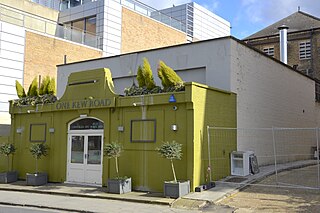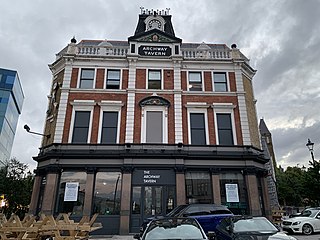
Dame Shirley Veronica Bassey is a Welsh singer. Known for her career longevity, powerful voice and recording the theme songs to three James Bond films, the only artist to perform more than one, Bassey is one of the most popular vocalists in Britain.

Cabaret is a form of theatrical entertainment featuring music, song, dance, recitation, or drama. The performance venue might be a pub, a casino, a hotel, a restaurant, or a nightclub with a stage for performances. The audience, often dining or drinking, does not typically dance but usually sits at tables. Performances are usually introduced by a master of ceremonies (M.C.). The entertainment, as performed by an ensemble of actors and according to its European origins, is often oriented towards adult audiences and of a clearly underground nature. In the United States, striptease, burlesque, drag shows, or a solo vocalist with a pianist, as well as the venues which offer this entertainment, are often advertised as cabarets.

The Beverly Hills Supper Club fire in Southgate, Kentucky, is the seventh deadliest nightclub fire in history. It occurred on the night of May 28, 1977, during the Memorial Day holiday weekend. A total of 165 people died and more than 200 were injured as a result of the blaze.

"Something" is a song by the English rock band the Beatles from their eleventh studio album Abbey Road (1969). It was written by George Harrison, the band's lead guitarist. Together with his second contribution to Abbey Road, "Here Comes the Sun", it is widely viewed by music historians as having marked Harrison's ascendancy as a composer to the level of the Beatles' principal songwriters, John Lennon and Paul McCartney. Two weeks after the album's release, the song was issued on a double A-side single, coupled with "Come Together", making it the first Harrison composition to become a Beatles A-side. The pairing was also the first time in the United Kingdom that the Beatles issued a single containing tracks already available on an album. While the single's commercial performance was lessened by this, it topped the Billboard Hot 100 in the United States as well as charts in Australia, Canada, New Zealand and West Germany, and peaked at number 4 in the UK.

The Hippodrome is a building on the corner of Cranbourn Street and Charing Cross Road in the City of Westminster, London. The name was used for many different theatres and music halls, of which the London Hippodrome is one of only a few survivors. Hippodrome is an archaic word referring to places that host horse races and other forms of equestrian entertainment.

The London Trocadero was an entertainment complex on Coventry Street, with a rear entrance in Shaftesbury Avenue, London. It was originally built in 1896 as a restaurant, which closed in 1965. In 1984, the complex reopened as an exhibition and entertainment space. It became known for the video-game oriented SegaWorld attractions which were added in 1996, and later downscaled and renamed to "Funland" before its closure in 2011. Part of the building was opened as a hotel in 2020.

The Crawdaddy Club was a music venue in Richmond, Surrey, England, which opened in 1963. The Rolling Stones were its house band in its first year and were followed by The Yardbirds. Several other notable British blues and rhythm and blues acts also played there.

"Big Spender" is a song written by Cy Coleman and Dorothy Fields for the musical Sweet Charity, first performed in 1966. Peggy Lee was the first artist to record the song, also on the album of the same name. It is sung, in the musical, by the dance hostess girls; it was choreographed by Bob Fosse for the Broadway musical and the 1969 film. It is set to the beat of a striptease as the girls taunt the customers.
"Just One of Those Things" is a popular song written by Cole Porter for the 1935 musical Jubilee.

The Bag O'Nails was a live music club and meeting place for musicians in the 1960s and situated at 9 Kingly Street, Soho, London, England.

Anne Pigalle is a French singer and multimedia artist.

The Café de Paris was a London nightclub, located in the West End, beside Leicester Square on Coventry Street, Piccadilly. Opened in 1924, it became one of the leading theatre clubs in London. After being hit by a German bomb in 1941, when at least 34 people were killed and around 80 injured, it was closed until 1948.

The Fabulous Shirley Bassey is the third studio album by Welsh singer Shirley Bassey, and her first for Columbia Records. It was recorded with Geoff Love and his orchestra, and peaked at #12 in the UK album chart in early 1961. Released in 1959, this was the first studio album from Shirley Bassey with completely new material. Her two previous albums issued on the Philips label were collections of new recordings and previously released material, recorded between 1956 and 1958.

Keep the Music Playing is a 1991 album by Shirley Bassey. The album was recorded in the UK at the Westgreen Studios and in the Netherlands at Wisseloord Studios, Hilversum. The album is a mixture of contemporary pop ballads, such as "I Want to Know What Love Is" from Foreigner, the Jennifer Rush power ballad "The Power of Love", and the more gentle "Still" from Lionel Richie, combined with standards from the field of jazz and pop, such as "He Was Beautiful", the sweet jazz ballad from Cleo Laine. Several of the song arrangements reflect an operatic pop style influence, which may have roots in her 1984 album I Am What I Am, which she recorded with the London Symphony Orchestra, and the fact that in the latter mid-1980s she started working with a vocal coach, a former opera singer. Bassey returned to the Beatles with "Yesterday", as she had previously covered "Something" and "Fool on the Hill" successfully in the 1970s, and had performed "Hey Jude" frequently live. Another previously successful formula was used for the closing track "Dio, Come Ti Amo " an Italian original in the tradition of "This is My Life" and "Natalie"..
Miss Polly Rae is a British singer, dancer, and Neo-burlesque performer.
"The Second Time Around" is a song with words by Sammy Cahn and music by Jimmy Van Heusen. It was introduced in the 1960 film High Time, sung by Bing Crosby with Henry Mancini conducting his orchestra, and was nominated for the Academy Award for Best Original Song. It lost out to "Never on Sunday".
Albon Timothy was a Trinidadian jazz and calypso musician and songwriter who played numerous instruments but was best known for his tenor saxophone playing. His most successful hit as a songwriter was "Kiss Me, Honey Honey, Kiss Me", written with Michael Julien, which reached number 3 in 1959 in the charts sung by Shirley Bassey.

The Archway Tavern in Archway, London, is on Highgate Hill near Archway tube station.















